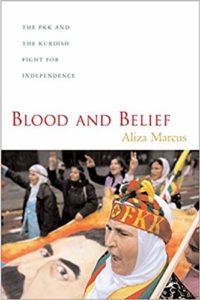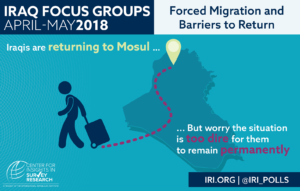 The United States announced last month that it intends to keep troops in Syria to support Kurdish-led fighters there until the Islamic State has been completely routed and the area stabilized, notes Aliza Marcus (@AlizaMarcus), the author of “Blood and Belief: The P.K.K. and the Kurdish Fight for Independence.”
The United States announced last month that it intends to keep troops in Syria to support Kurdish-led fighters there until the Islamic State has been completely routed and the area stabilized, notes Aliza Marcus (@AlizaMarcus), the author of “Blood and Belief: The P.K.K. and the Kurdish Fight for Independence.”
Although this long-term commitment is critical, real stability and security can be ensured only by providing political recognition and practical support to the Kurdish administration governing northeastern Syria, she writes for The New York Times:
It is the time for Washington to stop treating the Kurds as effective but disposable partners in the fight against the jihadists. The Kurdish experiment in Syria, however flawed, is a possible route to long-term stability. With assistance and recognition, the United States can salvage part of Syria, give the Kurds the backing they need to demand a fair settlement from Damascus and retain a base for future operations against violent extremists.
 As ISIS fighters leave Iraq and Syria, many are travelling to other countries to join fights. Homegrown terrorists are taking inspiration from ISIS and carrying out attacks in their home cities, from New York to London and Berlin and from Bamako in Mali to Ouagadougou in Burkina Faso, Thomas Frank writes for The Arab Weekly.
As ISIS fighters leave Iraq and Syria, many are travelling to other countries to join fights. Homegrown terrorists are taking inspiration from ISIS and carrying out attacks in their home cities, from New York to London and Berlin and from Bamako in Mali to Ouagadougou in Burkina Faso, Thomas Frank writes for The Arab Weekly.
“The security situation is backsliding [in Iraq]. There’s no point denying that. ISIS is re-energised,” said Ahmed Ali, director of the Iraq program at the National Endowment for Democracy. Calling Iraq’s government “ineffective” under Prime Minister Haider al-Abadi, Ali cited recent attacks near the US Embassy in Baghdad and on the airport area in Basra, which houses the US Consulate.
“It took only two years for ISIS to establish itself,” Ali told a Hudson Institute event. “Two years of bad government will lead to ISIS again.”
 In Limiting Corruption Opportunities in Iraq, an contribution to the Fikra Forum, Iraqi analyst Hashim Al-Rikabi highlights the role that new technologies and counter-corruption measures successfully utilized elsewhere can play for the Iraqi federal government in its gargantuan task of limiting corruption.
In Limiting Corruption Opportunities in Iraq, an contribution to the Fikra Forum, Iraqi analyst Hashim Al-Rikabi highlights the role that new technologies and counter-corruption measures successfully utilized elsewhere can play for the Iraqi federal government in its gargantuan task of limiting corruption.
Iranian actions actively threaten Iraqi democracy, argues Mithal Al-Alusi, a former member of the Iraqi parliament, and founder of the Democratic Party of the Iraqi Nation. Political parties affiliated with Iran have worked in a concerted manner to forge election results in both Shi’a and Sunni provinces—the latter of which contain Sunnis suffering from corruption who are linked through mutual connections  with Quds Force head Major General Qassem Soleimani (right) and his followers, he writes for the Fikra Forum.
with Quds Force head Major General Qassem Soleimani (right) and his followers, he writes for the Fikra Forum.
Recent developments in Iraqi government formation are indicating to domestic pro-democracy political elements that Iran has won over the United States in terms of influence. Al-Alusi argues that the current U.S. administration must clarify its position on Iraqi politics if its hopes to mitigate this impression, in assessing The United States’ Role in the Future of Iraq.







